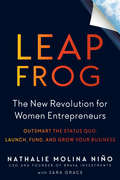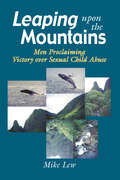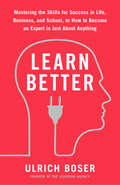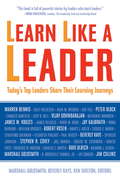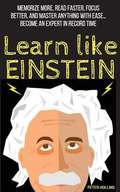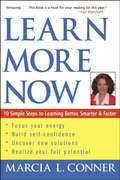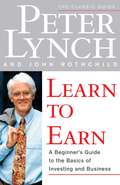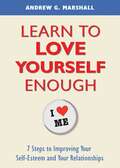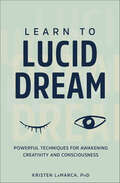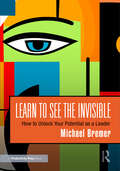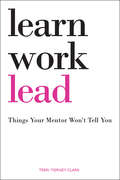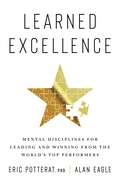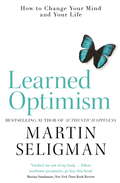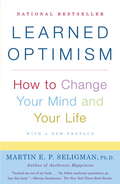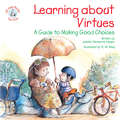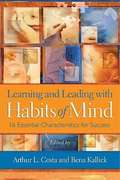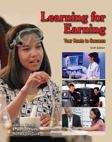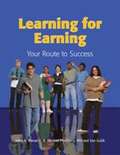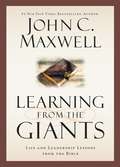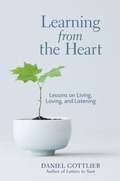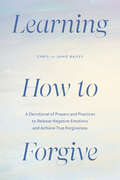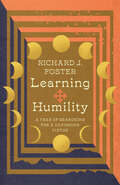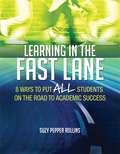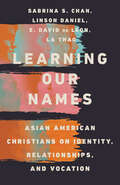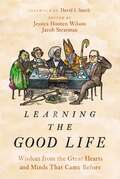- Table View
- List View
Leapfrog: The New Revolution for Women Entrepreneurs
by Nathalie Molina Niño Sara GraceFor women entrepreneurs (and anyone sick of the status quo), this smart, unapologetic collection delivers fifty proven hacks to leapfrog over obstacles and succeed in business."A must-read for any woman who has a great idea and the nagging thought that doors are closed to her; Molina Niño helps to blow them open."--Publishers WeeklyThink the most critical factor for becoming a great entrepreneur is grit, risk-taking, or technical skills? Think again. Despite what every other business book might say, historical data show the real secret ingredients to getting ahead in business are being rich, white, and male. Until now. Leapfrog is the decades-overdue startup bible for the rest of us. It's filled with uncompromising guidance for winning at business, your way. Leapfrog is for entrepreneurs of all stripes who are fed up with status quo advice--the kind that assumes you have rich friends and family and a public relations team.Refreshingly frank and witty, author Nathalie Molina Niño is a serial tech entrepreneur, the founder and CEO of BRAVA Investments, and a proud daughter of Latinx immigrants. While teaching budding entrepreneurs at Barnard College at Columbia University and searching the globe for investment-worthy startups, she has met or advised thousands of entrepreneurs who've gone from zero to scalable business. Here she shares their best secrets in the form of fifty "leapfrogs"--clever loopholes and shortcuts to outsmart, jump over, or straight up annihilate the seemingly intractable hurdles facing entrepreneurs who don't have family money, cultural capital, or connections.
Leaping upon the Mountains
by Mike LewPresenting the first real investigation of what male sexual assault survivors themselves identity as most important during various stages of recovery, Leaping upon the Mountains contains powerfully moving contributions from hundreds of men of all ages and backgrounds throughout the United States and 45 other countries. It is not a work of fiction, but a compilation of many truths, many realities -- a quilt pieced together from men's experiences -- forming an impressively triumphant pattern. Taken together, they state, lucidly and forcefully, that recovery work produces changes that are real, important, and permanent. Leaping upon the Mountains is a celebration of successful recovery, which offers hope and encouragement to all male survivors of sexual child abuse. Readers will discover: * Encouraging and inspiring messages from other male survivors * A large resource section providing concrete help to survivors and professionals * Ways of reconnecting with their own strength and creativity This book is about successes. Its contributors speak eloquently and persuasively of the reality of recovery.
Learn Better: Mastering the Skills for Success in Life, Business, and School, or, How to Becom e an Expert in Just About Anything
by Ulrich BoserFor centuries, experts have argued that learning was about memorizing information: You're supposed to study facts, dates, and details; burn them into your memory; and then apply that knowledge at opportune times. But this approach to learning isn’t nearly enough for the world that we live in today, and in Learn Better journalist and education researcher Ulrich Boser demonstrates that how we learn can matter just as much as what we learn.In this brilliantly researched book, Boser maps out the new science of learning, showing how simple techniques like comprehension check-ins and making material personally relatable can help people gain expertise in dramatically better ways. He covers six key steps to help you “learn how to learn,” all illuminated with fascinating stories like how Jackson Pollock developed his unique painting style and why an ancient Japanese counting device allows kids to do math at superhuman speeds. Boser’s witty, engaging writing makes this book feel like a guilty pleasure, not homework.Learn Better will revolutionize the way students and society alike approach learning and makes the case that being smart is not an innate ability—learning is a skill everyone can master. With Boser as your guide, you will be able to fully capitalize on your brain’s remarkable ability to gain new skills and open up a whole new world of possibilities.
Learn Like a Leader: Today's Top Leaders Share Their Learning Journeys
by Marshall Goldsmith Beverly Kaye Ken SheltonMore than a decade ago, a group of bestselling authors, thought leaders and management experts—among them Marshall Goldsmith, Beverly Kaye and Ken Shelton—met to share their defining moments on leadership with one another. So taken were they with each other’s stories that an annual tradition of trading leadership secrets was established. A recurring truth emerged: great leaders seize the opportunity to learn, again and again. Learn Like a Leader brings together these remarkable stories of learning and provides a close look at how top leaders—including Jim Collins, Warren Bennis and Dave Ulrich—were able to grow their careers, overcome setbacks and soar to the top. Offering profound lessons from key learning moments in the lives and careers of the contributors, Learn Like a Leader conveys the power of storytelling in teaching, training and mentoring.
Learn Like Einstein: Memorize More, Read Faster, Focus Better, and Master Anything With Ease... Become An Expert in Record Time (Accelerated Learning)
by Peter HollinsThis book is a collection of learning techniques that are guaranteed to make you retain more and learn faster, even if you hate what you're looking at. You still may not be happy that you're learning or studying at all, but at least you'll accomplish more in less time, and be able to move on to other activities sooner rather than later.
Learn More Now: 10 Simple Steps to Learning Better, Smarter, and Faster
by Marcia L. ConnerThis book is part road map, part blueprint, and part magical decoder ring, all rolled into one. The primary purpose of this book is to help you create a meaningful and fulfilling life by embracing the nature of continual learning. Its also about more than just learning. Learn More Now will help you become more aware, more focused, aligned with your natural pace, and improvisational in whatever you do. It will encourage you to learn your own life's lessons, and grow into your potential.
Learn to Earn: A Beginner's Guide to the Basics of Investing and
by Peter Lynch John RothchildMutual-fund superstar Peter Lynch and author John Rothchild explain the basic principles of investing and business in a primer that will enlighten and entertain anyone who is high-school age or older.Many investors, including some with substantial portfolios, have only the sketchiest idea of how the stock market works. The reason, say Lynch and Rothchild, is that the basics of investing -- the fundamentals of our economic system and what they have to do with the stock market -- aren't taught in school. At a time when individuals have to make important decisions about saving for college and 401(k) retirement funds, this failure to provide a basic education in investing can have tragic consequences.For those who know what to look for, investment opportunities are everywhere. The average high-school student is familiar with Nike, Reebok, McDonald's, the Gap, and the Body Shop. Nearly every teenager in America drinks Coke or Pepsi, but only a very few own shares in either company or even understand how to buy them. Every student studies American history, but few realize that our country was settled by European colonists financed by public companies in England and Holland -- and the basic principles behind public companies haven't changed in more than 300 years.In Learn to Earn, Lynch and Rothchild explain in a style accessible to anyone who is high-school age or older how to read a stock table in the daily newspaper, how to understand a company annual report, and why everyone should pay attention to the stock market. They explain not only how to invest, but also how to think like an investor.
Learn to Love Yourself Enough: 7 Steps to Improving Your Self-Esteem and Your Relationships
by Andrew G. MarshallCreate a wealth of self-worth.In a black-and-white world, there are two types of people—those who love themselves too much (and walk over everybody else) or hate themselves for failing to achieve goals (and probably end up being taken advantage of by others). But, according to British marital therapist, Andrew G. Marshall, neither has a healthy perception of oneself. This is because the secret to self-esteem does not lie in the extremes of love and hate, but in the middle, in the gray area that teaches us to love ourselves just enough: enough to have love to offer others; enough to be open to receive love from others. Only when this kind of balance is created, can self-love exist.Like no other book on self-esteem ever written, Learn to Love Yourself Enough helps readers walk through life on middle ground by revealing the seven factors that, together, add up to a wealth of self-worth. Examine your relationship with your parents: Discover the six types of child-parent relationships and how to accept the legacy of your past. Find Forgiveness: Debunk the two myths about forgiveness and discover what can be gained from negative experiences. Don't let other people put you down: Recognize the five phases of projection and how understanding our own projections lead to better and happy relationships. Re-program your inner voice: Identify the three kinds of negative thinking that work together to undermine self-confidence and whether they are based on fact or just opinion. Set realistic goals: Learn how perfectionism undermines self-esteem. Re-balance yourself: Understand that problems lurk in the extremes and why the middle way is the most successful way. Conquer Fears and Setbacks: Overcome the day-to-day problems that life and other people throw at us.
Learn to Lucid Dream: Powerful Techniques for Awakening Creativity and Consciousness
by Kristen LaMarcaFollow your dreams and discover your best self—a beginner's guide.You're the stuff dreams are made of—or rather, your subconscious is. Learn to Lucid Dream teaches you how to deliberately explore and manipulate your dreams (called "lucid dreaming") to gain insight into your inner self. You might even learn to conquer your nightmares—or just enjoy the dreamy freedom of flying.This methodical introduction teaches you both the science and spirituality of dreaming. You'll practice developing dream awareness and apply the discoveries you make while sleeping towards improving your waking hours. Lucid dreaming can help you heighten your focus, prioritize your core values, and be more observant.This guide to lucid dreaming includes:Step-by-step plan—Follow each chapter's research-based lessons and techniques to develop and hone your lucid dreaming skills.Personal accounts—Hear the author's firsthand anecdotes of lucid dreaming—and the positive effects their lessons have had on her life.Dream sequence—Solidify your new skills in a 24-hour lucid dreaming practice sequence, including exercises for morning, daytime, bedtime, and nighttime.Learning the extraordinary art of lucid dreaming is easier than you think with the techniques in Learn to Lucid Dream.
Learn to See the Invisible: How to Unlock Your Potential as a Leader
by Michael BremerMost improvement consultants say improvement efforts must be led by the CEO, and that is certainly ideal. But the actual reality is most CEOs do not actively drive/guide improvement. They want it to happen, but they focus most of their energy on other issues. According to surveys from Gallup and others, the number one reason people say, “I am not engaged” is due to the behaviors of their direct boss! Those leaders (in the middle of an organization) have a tremendous amount of leverage; first- and second-line leaders directly touch 80% of the people in their organization. They have a tremendous amount of influence and more power than they might realize. This book focuses on that demographic.This book describes four key foundations and 25 different actions leaders can practice to become more effective in training their eyes to see things tomorrow that are currently invisible. It helps leaders and managers to become better observers of their current reality by practicing getting better at getting better. The goal is to get better in the way we lead, the way our team performs, and the results we accomplish. If done in the right way, visually posting your improvement targets is the key to driving more personal growth, as well as more cross-functional collaboration and cooperation in your work activities. The most unique aspect of this book is that it suggests leaders use visual tools.Visual Leadership is the fourth foundational element the author encourages people to practice. The primary purpose of visual performance metrics isn’t to make sure things are working well in your department. It’s to create a thinking environment that makes it easier for multiple departments, teams, and groups to work together. It is relatively easy to come up with performance metrics for your team, but what about metrics that help “us” to work more effectively together? Good visual reporting practices create “information democracy.” They eliminate filters that obscure knowledge between layers of management and between departments. They help to create an environment that is much more robust and open, making it easier to be in touch with the “actual reality.” And perhaps the most exciting of all, visual tools can help an individual learn to lead more effectively. The power of using visuals in this way is underutilized in most organizations.Whatever new behaviors a leader is trying to accomplish, visual reporting can facilitate progress and ensure accountability in developing those new habits.
Learn, Work, Lead: Things Your Mentor Won't Tell You
by Terri Tierney ClarkIn today's world, women's career success relies on much more than just taking advice from a mentor, knowing how to network, and being proactive. Young professional women have to learn how to analyze career decisions for themselves and figure out what to do when their decisions don't work out. Learn, Work, Lead: Things Your Mentor Won't Tell You is a cutting-edge career and job search guide that will teach you those skills and give you the tools to navigate successfully in a gender-biased workplace. It will show you how to plan your career now so that you will be chosen to lead in the future. Coaching on how to analyze career decisions and make the best choices even when your solutions differ from your mentors' advice. Guidance on how to succeed even when you're faced with problems that no one could predict. Tools to develop your optimal career plan. Lessons from top business leaders' career war stories.
Learned Excellence: Mental Disciplines for Leading and Winning from the World's Top Performers
by Eric Potterat Alan EagleLearn how to perform at your very best, from the psychologist who has advised elite military operators, Olympic medalists, big wave surfers, neurosurgeons, cliff divers, first responders, Cirque du Soleil acrobats, professional athletes and coaches, Fortune 500 business executives, and CIA analysts. Learned Excellence is a comprehensive and practical guide to the mental disciplines of high performance, from the expert who developed the US Navy SEALs mental toughness curriculum and has worked with thousands of top athletes, elite military personnel, business executives, and first responders. These stars perform across a wide variety of fields, but they all have something in common: when they are at work they know how to think clearly, stay focused, and shrug off setbacks under very high levels of stress. They may have superb physical and intellectual traits, but it is the stuff going on above the neck and between the ears that makes them excellent. The difference between settling and achieving, between good and great, between contentment and fulfillment, is based entirely on their mental approach. This approach isn’t innate; it is 100% learned. The world’s top performers aren’t born that way, they learn excellence. So can everyone else, and Dr. Eric Potterat can teach us. One of the world’s leading performance psychologists and a retired US Navy Commander, Dr. Potterat has spent over three decades helping thousands of top performers from the military, sports, first responder, and business worlds improve. He served as the lead psychologist for the US Navy SEALs and the Los Angeles Dodgers, and has consulted with the US Women’s National Soccer team, the Miami Heat, Red Bull athletes, NASA astronauts, and dozens of Olympic medalists.In Learned Excellence, Eric distills the insights he’s learned into five mental disciplines for high performance—Values & Goals, Mindset, Process, Adversity Tolerance, and Balance & Recovery. Illustrated with numerous stories and quotes, Learned Excellence features clear principles and practices that anyone can use to raise their game. We are all performers, at work, at school, at home, and at life. Learned Excellence provides the roadmap to help each of us perform at our very best.
Learned Optimism: How to Change Your Mind and Your Life
by Martin SeligmanFrom the bestselling author of Authentic HappinessKnown as the father of the science of positive psychology, Martin E.P. Seligman draws on more than twenty years of clinical research to demonstrate how optimism enhances the quality of life, and how anyone can learn to practice it. Offering many simple techniques, Dr. Seligman explains how to break an 'I give up' habit, develop a more constructive explanatory style for interpreting your behaviour, and experience the benefits of a more positive interior dialogue. These skills can help break up depression, boost your immune system, better develop your potential, and make you happier. With generous additional advice on how to encourage optimistic behaviour at school, at work and in children, Learned Optimism is both profound and practical, making it highly valuable for every phase of life.
Learned Optimism: How to Change Your Mind and Your Life
by Martin E. SeligmanKnown as the father of the new science of positive psychology, Martin E.P. Seligman draws on more than twenty years of clinical research to demonstrate how optimism enhances the quality of life, and how anyone can learn to practice it. Offering many simple techniques, Dr. Seligman explains how to break an "I-give-up" habit, develop a more constructive explanatory style for interpreting your behavior, and experience the benefits of a more positive interior dialogue. These skills can help break up depression, boost your immune system, better develop your potential, and make you happier. With generous additional advice on how to encourage optimistic behavior at school, at work and in children, Learned Optimism is both profound and practical--and valuable for every phase of life.
Learning about Virtues: A Guide to Making Good Choices
by R. W. Alley Juliette Garesché DagesThis book introduces the concept and basic vocabulary of virtues. It helps children to recognize and label the behaviors which they are striving to develop. When a child attains a virtue, that trait will become almost habitual for them. But it isn't always easy. Life produces many challenges, and today's culture often seems to oppose virtue. However, through faith, example, and practicing individual virtues, a child will keeping growing through adulthood, planting more seeds of God's goodness along the way. We hope you have fun introducing virtues to the children in your life. This book is just the start. Be creative, and don't forget to catch your children being good! Praise their every effort toward goodness and God-likeness.
Learning and Leading With Habits of Mind: 16 Essential Characteristics for Success
by Arthur L. Costa Bena KallickIn Learning and Leading with Habits of Mind, noted educators Arthur L. Costa and Bena Kallick present a comprehensive guide to shaping schools around Habits of Mind. The habits are a repertoire of behaviors that help students and teachers successfully navigate the various challenges and problems they encounter in the classroom and in everyday life. The Habits of Mind include: Persisting, Managing impulsivity, Listening with understanding and empathy, Thinking flexibly, Thinking about thinking (metacognition), Striving for accuracy, Questioning and posing problems, Applying past knowledge to new situations, Thinking and communicating with clarity and precision, Gathering data through all senses, Creating, imagining, innovating, Responding with wonderment and awe, Taking responsible risks, Finding humor, Thinking interdependently, Remaining open to continuous learning.
Learning for Earning: Your Route to Success, 6th Edition
by John A. Wanat E. Weston Pfeiffer Richard Van GulikLearning for Earning presents the skills students need to succeed in school, on the job, and on their own. Teacher's Wraparound Edition provides teaching aids in the page margins for reviewing and reinforcing text content plus challenging activities that extend learning. The text includes a running glossary to highlight new terms presented in the chapters.
Learning for Earning: Your Route to Success
by John A. Wanat E. Weston Pfeiffer Richard Van GulikFocuses on helping students understand self first, then making a career match. Identifies the workplace know-how needed for success on the job, as determined by the Secretary's Commission on Achieving Necessary Skills (SCANS).
Learning from the Giants: Life and Leadership Lessons from the Bible (Giants of the Bible)
by John C. MaxwellIf you could spend a few minutes with the giants of faith in the Old Testament in person, what lessons would they share with you? In LEARNING FROM THE GIANTS John C. Maxwell draws on fifty years of studying the Bible to share the stories of Elijah, Elisha, Job, Jacob, Deborah, Isaiah, Jonah, Joshua and Daniel. These people fought and won epic battles, served kings, and endured great hardships for God to come out on the other side transformed through His grace. Through them Maxwell explores timeless lessons we can learn about leadership, ourselves, and our relationship with God.
Learning from the Heart: Lessons on Living, Loving, and Listening
by Daniel GottliebIn the nearly 30 years since the accident that made radio personality and columnist Dan Gottlieb a quadriplegic, he developed a finely-tuned quality of awareness that most people never achieve: he became an outsider among us--"like a foreign correspondent," as he puts it. From that vantage point, he has acutely observed the way people act, think, feel, and live--in short, he studied and learned exactly what it means to be human. Here, Dan shares his insights, written with humor, honesty, a gift for storytelling, and breathtaking compassion. Learning from the Heart looks at what divides as well as unites us, including the problems of family life; difficulties confronting today's parents; challenges faced by the disabled and the aging; and issues of injustice that affect the way we understand the world and our lives. Although Dan is now speaking directly to the reader, rather than to his own family, you'll recognize the distinctive voice and format that caused an outpouring of e-mail from fans of Letters to Sam: short anecdotal chapters rich in wisdom, generously revealing and deeply personal, and resonating with universal truths.
Learning How to Forgive: A Devotional of Prayers and Practices to Release Your Negative Emotions and Achieve True Forgiveness
by Chris Bailey Jamie BaileyThe only Christian devotional on forgiveness offering weekly prayers and faith-based practices to heal and find a path toward a forgiving heart.Forgiveness isn&’t just a one-time decision, but a journey that none of us asked to go on. Whether you are wrestling with an offense, replaying painful memories, or don&’t know how to forgive and move forward, God is waiting and ready to lead you to the freedom that forgiveness offers. Through weekly devotions, prayers, and faith-based practices, Learning How to Forgive invites you to release pain to Him, process, and find a way forward. Authors and renowned Christian counselors Chris and Jamie Bailey use their professional and personal encounters of forgiveness to share encouraging messages of hope and assure you that God rejoices and dwells in a forgiving heart. Learning How to Forgive features: 52 WEEKS OF SUPPORTIVE DEVOTIONS: Relatable biblical messages and honest prayers to accompany you on your forgiveness journey SCRIPTURE VERSES FULL OF GOD&’S WISDOM: Carefully selected bible verses to comfort the wounded spirit FAITH-BASED EXERCISES FOR HEALING: Simple steps to draw you closer to the Lord and deepen your understanding of forgiveness through God&’s will and love PRACTICAL GUIDANCE: Skills to incorporate into everyday life instantly and easily to reroute negative and cyclical thoughts TRUSTED CHRISTIAN COUNSELORS: Chris and Jamie Bailey, trained and established Christian counselors of Expedition Marriage, share the healing, abundant joy, and love that comes with thriving in Christ.
Learning Humility: A Year of Searching for a Vanishing Virtue
by Richard J. FosterIn a society where raging narcissism dominates the moral landscape, the virtue of humility is often dismissed as irrelevant.Learning HumilityJoin Richard Foster on the journey toward a life of humility, which he says leads us into "freedom, joy, and holy hilarity."
Learning In The Fast Lane: 8 Ways To Put All Students On The Road To Academic Success
by Suzy Pepper RollinsToo often, students who fail a grade or a course receive remediation that ends up widening rather than closing achievement gaps. According to veteran classroom teacher and educational consultant Suzy Pepper Rollins, the true answer to supporting struggling students lies in acceleration. In Learning in the Fast Lane, she lays out a plan of action that teachers can use to immediately move underperforming students in the right direction and differentiate instruction for all learners—even those who excel academically. This essential guide identifies eight high-impact, research-based instructional approaches that will help you <p><p> * Make standards and learning goals explicit to students. <p> * Increase students' vocabulary—a key to their academic success. <p> * Build students' motivation and self-efficacy so that they become active, optimistic participants in class. <p> * Provide rich, timely feedback that enables students to improve when it counts. <p> * Address skill and knowledge gaps within the context of new learning. <p> Students deserve no less than the most effective strategies available. These hands-on, ready-to-implement practices will enable you to provide all students with compelling, rigorous, and engaging learning experiences.
Learning Our Names: Asian American Christians on Identity, Relationships, and Vocation
by Sabrina S. Chan Linson Daniel E. David de Leon La ThaoWhat's your name?Asian Americans know the pain of being called names that deny our humanity. We may toggle back and forth between different names as a survival strategy. But it's a challenge to discern what names reflect our true identities as Asian Americans and as Christians. In an era when Asians face ongoing discrimination and marginalization, it can be hard to live into God's calling for our lives.Asian American Christians need to hear and own our diverse stories beyond the cultural expectations of the model minority or perpetual foreigner. A team from East Asian, Southeast Asian, and South Asian backgrounds explores what it means to learn our names and be seen by God. They encourage us to know our history, telling diverse stories of the Asian diaspora in America who have been shaped and misshaped by migration, culture, and faith. As we live in the multiple tensions of being Asian American Christians, we can discover who we are and what God may have in store for us and our communities.
Learning the Good Life: Wisdom from the Great Hearts and Minds That Came Before
by Jessica Hooten Wilson Jacob StratmanDiscover the Good Life as You Learn from the Wise Voices of the PastWe've lost ourselves. Disconnected from the past and uncertain about the future, we are anxious about what our lives will be and troubled by a nagging sense of meaninglessness. Adrift in the world, many Christians have their identity completely wrapped up in work and their definition of the "good life" is financial success. Fewer of are staying committed to the Christian faith, finding it difficult to reconcile their experience with their longings and desires. With so much uncertainty, where can we find a true vision of "the Good Life"?Learning the Good Life speaks to this malaise with trusted and assured voices from the past, inviting Christians into an age-old conversation with some of history's wisest hearts and minds as their dialogue companions. Featuring classic writings from a diverse lineup of over 35 writers and thinkers including Confucius, Augustine, Sor Juana Inés de la Cruz, W.E.B. DuBois, Flannery O'Connor, and Wendell Berry. Together these sages of the past address important issues such as:VocationCallingMeaningSufferingBeautyVirtueLearningWisdomCritical ThinkingCommunityWonderReflectionAnd moreEach of these texts are introduced by experts who are teachers, from a variety of Christian colleges and universities, to help providing a broader, richer, and more cohesive narrative in which Christians may participate. In addition to a substantive introduction, each text is accompanied by discussion questions to provoke further thought and contemplation and also to facilitate discussion when used in groups. Ideal for any Christian seeking a deeper connection to the wisdom of the past and wanting a more cohesive and beautiful vision of the good life. All the writers have a message for you. All of them are calling you to die to yourself, to your habits of indulgence, to your pride and ambition, and instead, dedicate your time to learning, thinking, and loving.Writers and writings featured in Learning the Good Life include:Lao Tzu, From Tao Te ChingConfucius, SelectionsPlato, The Allegory of the CaveSeneca the Younger, "On the Shortness of Life"Athanasius, On the IncarnationGregory of Nazianzus, On My Own VersesAugustine, On the TeacherAugustine, On Christian Doctrine, Book I.Pope Gregory the Great, Life of Saint Benedict, Dialogues, Book 2Dante Alighieri, The Divine Comedy, Inferno 1Nezahualcoyotl, "A Flower Song of Nezahualcoyotl"Margery Kempe, From "The Book of Margery Kempe"William Shakespeare, King LearJohn Amos Comenius, From The Labyrinth of the World and the Paradise of the HeartGeorge Herbert, Five PoemsBlaise Pascal, SelectionsMatsuo Basho, Three Haiku PoemsSor Juana Ines de la Cruz, "Respuesta a Sor Filotea de la Cruz"John Milton, AreopagiticaJonathan Edwards, "Personal Narrative"Edmund Burke, Reflections on the Revolution in FranceLord Alfred Tennyson, "Ulysses"Frederick Douglass, Narrative LifeElizabeth Barrett Browning, from Aurora LeighHenry David Thoreau, "Life Without Principle"Gerard Manley Hopkins, "As Kingfishers Catch
